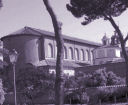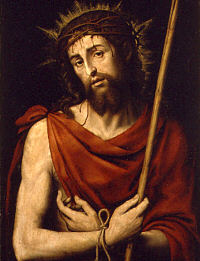Lent: February 10th
Ash Wednesday
Old Calendar: Ash Wednesday
The time has now come in the Church year for the solemn observance of the great central act of history, the redemption of the human race by our Lord and Savior Jesus Christ. In the Roman Rite, the beginning of the forty days of penance is marked with the austere symbol of ashes which is used in today's liturgy. The use of ashes is a survival from an ancient rite according to which converted sinners submitted themselves to canonical penance. The Alleluia and the Gloria are suppressed until Easter.
Abstinence from eating meat is to be observed on all Fridays during Lent. This applies to all persons 14 and older. The law of fasting on Ash Wednesday and Good Friday applies to all Catholics from age 18 through age 59.
The feast of St. Scholastica, which is ordinarily celebrated today, is superseded by the Ash Wednesday liturgy.
Ash Wednesday At the beginning of Lent, on Ash Wednesday, ashes are blessed during Mass, after the homily. The blessed ashes are then "imposed" on the faithful as a sign of conversion, penance, fasting and human mortality. The ashes are blessed at least during the first Mass of the day, but they may also be imposed during all the Masses of the day, after the homily, and even outside the time of Mass to meet the needs of the faithful. Priests or deacons normally impart this sacramental, but instituted acolytes, other extraordinary ministers or designated lay people may be delegated to impart ashes, if the bishop judges that this is necessary. The ashes are made from the palms used at the previous Passion Sunday ceremonies.
At the beginning of Lent, on Ash Wednesday, ashes are blessed during Mass, after the homily. The blessed ashes are then "imposed" on the faithful as a sign of conversion, penance, fasting and human mortality. The ashes are blessed at least during the first Mass of the day, but they may also be imposed during all the Masses of the day, after the homily, and even outside the time of Mass to meet the needs of the faithful. Priests or deacons normally impart this sacramental, but instituted acolytes, other extraordinary ministers or designated lay people may be delegated to impart ashes, if the bishop judges that this is necessary. The ashes are made from the palms used at the previous Passion Sunday ceremonies.
— Ceremonies of the Liturgical Year, Msgr. Peter J. Elliott
The act of putting on ashes symbolizes fragility and mortality, and the need to be redeemed by the mercy of God. Far from being a merely external act, the Church has retained the use of ashes to symbolize that attitude of internal penance to which all the baptized are called during Lent. — Directory on Popular Piety and the Liturgy
From the very early times the commemoration of the approach of Christ's passion and death was observed by a period of self-denial. St. Athanasius in the year 339 enjoined upon the people of Alexandria the 40 days' fast he saw practiced in Rome and elsewhere, "to the end that while all the world is fasting, we who are in Egypt should not become a laughing stock as the only people who do not fast but take our pleasure in those days." On Ash Wednesday in the early days, the Pope went barefoot to St. Sabina's in Rome "to begin with holy fasts the exercises of Christian warfare, that as we do battle with the spirits of evil, we may be protected by the help of self-denial."
— Daily Missal of the Mystical Body
Things to Do:
- Go with your family to receive ashes at Mass today. Leave them on your forehead as a witness to your faith. Here is a Lenten reflection on the meaning of the ashes on Ash Wednesday. If you have children, you may want to share this with them in terms that they can understand.
- Today parents should encourage their children to reflect upon what regular penances they will perform throughout this season of Lent. Ideally, each member of the family should choose his own personal penance as well as some good act that he will perform (daily spiritual reading, daily Mass, extra prayers, almsgiving, volunteer work, housecleaning, etc.), and the whole family may wish to give up one thing together (TV, movies, desserts) or do something extra (family rosary, Holy Hour, Lenten Alms Jar).
- The use of Sacrifice Beans may help children to keep track of their Lenten penances. Some families begin this activity (with undyed beans!) on Ash Wednesday and then use the collected beans to cook a penitential bean dish for Good Friday at the end of Lent.
- Here is a Lenten prayer that the family may pray every night from Ash Wednesday to the first Saturday in Lent, to turn the family's spiritual focus towards this holy season.
- Read Pope Francis's 2014 Message for Lent.
 Stational churches are the churches that are appointed for special morning and evening services during Lent, Easter and some other important days. The tradition started in order to strengthen the sense of community within the Church in Rome, as this system meant that the Holy Father would visit each part of the city and celebrate Mass with the congregation.
Stational churches are the churches that are appointed for special morning and evening services during Lent, Easter and some other important days. The tradition started in order to strengthen the sense of community within the Church in Rome, as this system meant that the Holy Father would visit each part of the city and celebrate Mass with the congregation.
The first stational church during Lent is St. Sabina at the Aventine. It was built in the 5th century, presumably at the site of the original Titulus Sabinae, a church in the home of Sabina who had been martyred c. 114. The tituli were the first parish churches in Rome. St Dominic lived in the adjacent monastery for a period soon before his death in 1221. Among other residents of the monastery were St Thomas Aquinas.
For more information, see Roman Pilgrimage: The Station Churches, a review of George Weigel's book by Jennifer Gregory Miller, The Pontifical North American College page, the Vatican's Lenten Calendar, and "Station Churches", a Lenten Journey by Fr. Bill.
